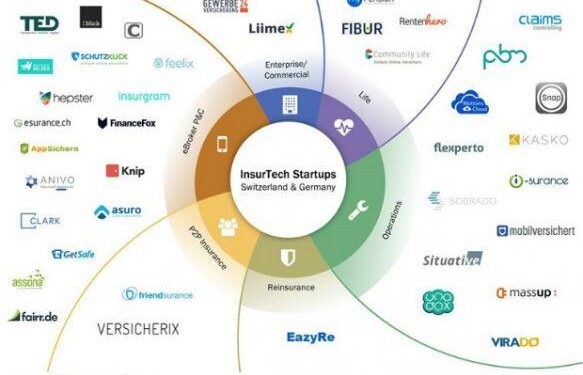In a significant development for the insurance sector, the National Insurance Commission (NAICOM) has unveiled new guidelines aimed at regulating insurtech operations in Nigeria. This strategic move seeks to foster innovation while ensuring consumer protection and operational efficiency within the rapidly evolving landscape of digital insurance services. As the market for insurtech continues to expand, these guidelines are expected to provide a robust framework that addresses emerging trends and challenges faced by industry players. Stakeholders are now tasked with adapting to these regulations as they navigate the intersection of technology and insurance in one of Africa’s most dynamic economies.
NAICOM Unveils Comprehensive Framework to Regulate Insurtech Innovations in Nigeria
The National Insurance Commission (NAICOM) has introduced a set of robust guidelines aimed at transforming the insurtech landscape in Nigeria. This comprehensive framework is designed to foster innovation while ensuring robust consumer protection and sound regulatory practices. The guidelines delineate the responsibilities of insurtech operators, enhancing transparency and compliance within the sector. Key aspects of the framework include:
- Operational Licensing: Insurtech firms must secure appropriate licensing to operate legally within the Nigerian insurance space.
- Consumer Protection Mechanisms: Enhanced measures are mandated to safeguard consumer interests, ensuring fair treatment and access to information.
- Technological Standards: Operators are required to adhere to specific technological norms to maintain system integrity and cybersecurity.
- Data Privacy Regulations: Stringent data protection protocols are emphasized to secure customer information against breaches.
- Reporting Requirements: Regular submissions to NAICOM concerning operational performance and consumer complaints are mandated.
This initiative not only aims to enhance operational standards within the insurtech sector but also to invigorate financial inclusion across Nigeria, paving the way for broader access to insurance products for underserved populations. To facilitate further understanding, a comparison of traditional insurance models and the insurtech approach can be summarized in the following table:
| Aspect | Traditional Insurance | Insurtech |
|---|---|---|
| Processes | Manual underwriting and claims processing | Automated and digital-first approaches |
| Customer Engagement | Agent-driven interactions | Platform and app-based engagement |
| Speed of Service | Longer processing times | Real-time service delivery |
| Product Offerings | Standardized products | Customized, flexible solutions |
Key Implications for Stakeholders and the Future of Insurance Technology in the Industry
The recent guidelines released by NAICOM herald a transformative phase for the insurtech sector in Nigeria, introducing measures intended to foster innovation while ensuring consumer protection and compliance. Stakeholders, including insurance companies, technology providers, and regulatory bodies, must now navigate a landscape characterized by enhanced oversight and clearer operational frameworks. This shift presents an opportunity for traditional insurers to pivot towards technology-driven solutions, tapping into the growing demand for *digital insurance products* that cater to a tech-savvy consumer base. Key implications include:
- Increased Investment: Stakeholders are expected to channel resources into technology development, aiming for improved customer experiences.
- Collaboration Opportunities: Enhanced cooperation between established insurers and tech startups may lead to innovative solutions tailored to local market needs.
- Compliance Challenges: Insurtechs will need to invest in compliance infrastructure to adhere to the new regulations.
Furthermore, the establishment of a regulatory framework aims to mitigate risks associated with insurtech operations, thereby instilling confidence among consumers. The guidelines stipulate a balanced approach that could pave the way for increased consumer trust and market penetration. Emphasizing financial inclusion, the regulations encourage innovative products that meet diverse customer needs. This evolution may result in:
- Enhanced Product Offerings: A broader range of personalized policies and coverage options.
- Market Growth: Increased penetration of insurance services in underrepresented demographics.
- Sustainability Initiatives: Continued emphasis on technology’s role in promoting sustainable insurance practices.
Expert Recommendations for Compliance and Strategic Adaptation Amid New Regulatory Landscape
As Nigeria embarks on a regulatory overhaul for insurtech operations, industry experts advocate for proactive compliance strategies that not only ensure adherence to the new guidelines but also foster innovation. Organizations should consider implementing robust compliance frameworks that include the following essential components:
- Risk Assessment: Regularly evaluate potential compliance risks associated with new technologies and market dynamics.
- Training Programs: Develop comprehensive training for staff on the new regulatory requirements and their implications.
- Stakeholder Engagement: Maintain ongoing dialogues with regulators and industry peers to stay informed about updates and challenges.
- Monitoring Mechanisms: Establish real-time monitoring systems to track compliance and identify issues promptly.
Moreover, firms are encouraged to explore strategic adaptations that align with the evolving landscape. Companies can leverage technology to enhance their operational efficiency, thus positioning themselves favorably for future growth. Here are several strategic initiatives to consider:
- Innovation Hubs: Create internal teams dedicated to exploring emerging technologies like AI and blockchain to streamline processes.
- Partnerships: Collaborate with fintech and technology companies to develop solutions that meet regulatory expectations while also benefiting customers.
- Consumer Education: Launch campaigns aimed at educating policyholders about the changes in coverage options and compliance.
| Strategic Initiative | Objective |
|---|---|
| Innovation Hubs | Drive technological advancements that comply with new regulations. |
| Partnerships | Enhance operational capabilities and service offerings. |
| Consumer Education | Increase awareness and understanding of insurance products. |
To Conclude
In conclusion, the newly released guidelines by the National Insurance Commission (NAICOM) mark a significant step towards the formalization and regulation of insurtech operations in Nigeria. As the insurtech landscape continues to evolve, these measures aim to enhance consumer protection, foster innovation, and ensure regulatory compliance within the industry. Stakeholders, from startups to established insurance firms, will undoubtedly need to adapt to this new framework as it seeks to balance the need for technological advancement with the imperative of maintaining market integrity. As Nigeria positions itself as a burgeoning hub for insurtech, the impact of these guidelines will be closely monitored, shaping the future of insurance accessibility and efficiency in the region.














